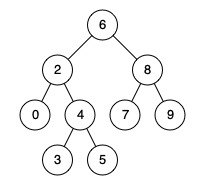Given a binary search tree (BST), find the lowest common ancestor (LCA) of two given nodes in the BST.
According to the definition of LCA on Wikipedia: “The lowest common ancestor is defined between two nodes p and q as the lowest node in T that has both p and q as descendants (where we allow a node to be a descendant of itself).”
Given binary search tree: root = [6,2,8,0,4,7,9,null,null,3,5]
Input: root = [6,2,8,0,4,7,9,null,null,3,5], p = 2, q = 8 Output: 6 Explanation: The LCA of nodes 2 and 8 is 6.
Input: root = [6,2,8,0,4,7,9,null,null,3,5], p = 2, q = 4 Output: 2 Explanation: The LCA of nodes 2 and 4 is 2, since a node can be a descendant of itself according to the LCA definition.
- All of the nodes' values will be unique.
- p and q are different and both values will exist in the BST.
# Definition for a binary tree node.# class TreeNode:# def __init__(self, x):# self.val = x# self.left = None# self.right = NoneclassSolution: deflowestCommonAncestor(self, root: 'TreeNode', p: 'TreeNode', q: 'TreeNode') ->'TreeNode': ifmax(p.val, q.val) <root.val: returnself.lowestCommonAncestor(root.left, p, q) elifmin(p.val, q.val) >root.val: returnself.lowestCommonAncestor(root.right, p, q) else: returnroot# Definition for a binary tree node.# class TreeNode:# def __init__(self, x):# self.val = x# self.left = None# self.right = NoneclassSolution: deflowestCommonAncestor(self, root: 'TreeNode', p: 'TreeNode', q: 'TreeNode') ->'TreeNode': whileTrue: ifmax(p.val, q.val) <root.val: root=root.leftelifmin(p.val, q.val) >root.val: root=root.rightelse: returnroot